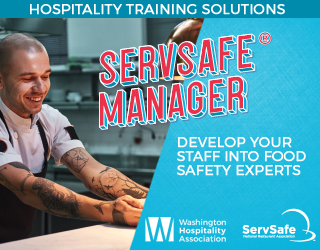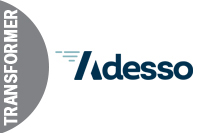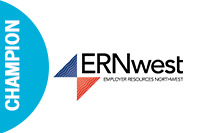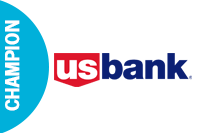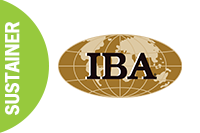We asked three of our advisory network members a few questions about operations. Here’s what they had to say.
Richard Finafrock, CPA, Peterson Sullivan LLP
Q: How do you work with the hospitality industry?
Myself and our Hospitality Industry team here at Peterson Sullivan LLP, provide traditional full-service CPA firm services to businesses and individuals operating within the hospitality industry. That includes not only restaurants, hotels and clubs, but also suppliers of products and services to those businesses.
In addition, we provide a wide range of other business services from full-service accounting solutions to consulting services related to business mergers, acquisitions and sales.
In a nutshell, my personal focus is on strategic federal and state income tax planning, as well as income tax compliance matters.
Q: What are the top operational challenges that hospitality businesses are facing?
From a tax standpoint, the top operational challenges I see have to do with the ever-changing tax law and related regulations. Keeping informed and up-to-date on the multitude of city, county, state and federal tax rules is a daunting task for businesses of any size. And failing to comply could subject a business to a variety of interest and penalty charges.
[expander_maker id=”1″ more=”Read more” less=”Read less”]
Q: How can operators combat their top operational challenges?
Engaging professional tax advisors can seem like an expensive proposition to some operators. However, the potential financial exposure for not keeping up-to-date on tax matters could result in an unanticipated financial burden to the business and/or business owner themselves. Failing to comply with tax rules could subject a business to a variety of interest and penalty charges.
Q: What do you think is the most important thing hospitality owners and operators should do to be successful?
Focus on what they do best. As an example, if the individual is a chef, he or she should focus their time and effort on running the restaurant operations and leave the accounting and finance tasks to others. Again, there is a cost in doing this either through additional labor cost for in-house accounting staff, or fees for outsourced accounting services.
Q: Are there any common threads you see that many successful owners and operators are doing?
From a tax perspective, there are opportunities for reducing income taxes or potentially benefiting from various tax incentives and credits, depending upon each business’ unique situation. Being mindful of tax considerations related to any course of action is important, though should not be the driving force behind any decision. Tax impacts should be just one of a multitude of considerations. Keeping informed about the ever-changing tax landscape is difficult, and having professionals in your corner who keep informed, such as the associations’ Advisory Network, is a huge help.
Q: Are there any trends in the industry that could help make managing a hospitality business easier or more efficient?
Improved automation of various aspects of running a business has been, and continues to be, extremely helpful. From computer accounting systems, to online reservation systems, to the ability to search for answers online, automation has made managing a business more efficient. I don’t know that it helps make things easier because the tendency is that as less time is spent on one aspect of the business, more time is spent on another area. However, as mentioned earlier, that does allow people to focus on what they do best, which in my experience is what helps owner/operators be successful.
Quentin Incao, CEO/Hospitality Guru, Q Hospitality Management
Q: How do you work with the hospitality industry?
Q Hospitality Management provides consulting and operational support to unique and distinctive hotels and restaurants, support of this great industry includes such areas as recruiting, interim executive management, operational consulting, product sourcing and so on. Under The Q Hotel Group brand we provide hotel management to unique and distinctive independent hotels. The Captain Whidbey is a great example of one of our unique hotels.
Q: What are the top operational challenges that hotels are facing?
From both the operator’s point of view and as a firm that provides recruiting, I would have to say that it is staffing and wage creep; and often, using our Whidbey Island hotel as an example, wage creep because of lack of staffing.
Q: How can hotel operators combat their top operational challenges?
Provide a great place to work and as generous a benefits package as your budget allows to differentiate your hotel from the comp set. Look to hire or interview potential team members who may not have the experience you are looking for but come with the right personality, a smile and hopefully great attention to detail. While this doesn’t work in all positions, hire for personality and train for the details. Another tactic is to look to an older generation for a more mature and potentially reliable team member for certain or appropriate positions.
Q: What do you think is the most important thing hotel owners and operators should do to be successful?
I truly believe in focusing on our staff first and our guests second. A happy and empowered team provides great experiences, great experiences in turn create happy guests, happy guests generate great revenue, great revenue creates happy owners! Now that’s a great return on experience!
Q: Are there any common threads you see that many successful owners and operators are doing?
Depending on how you determine “successful,” a few areas that catch my attention are:
Creating a great presence either in name (front of mind) and/or on social media with images that tell stories without words or with few words
Creating unique experiences
Being known for those unique experiences
Taking care of their team members so they can accomplish and focus on the points previously mentioned
Q: Are there any trends in the industry that could help make managing a hospitality business easier or more efficient?
Some of the newer hospitality-focused, web-based technologies and programs or SaaS (software as a service) have intriguing possibilities to replace more costly legacy programs/systems and with enhanced capability and web-based access, some of these can streamline an operation, cut down on administrative time and provide more access and insight into your operations.
Catharine Morisset, Attorney at Law, Fisher & Phillips LLP
Q: How do you work with the hospitality industry?
I am a partner at Fisher Phillips, a national law firm dedicated to business solutions for employers’ workplace legal problems. I represent employers, in court and before regulatory agencies, and devote a portion of my practice to practical and preventative counseling. I am an active member of my firm’s Hospitality Group.
Q: What are the top operational challenges that hospitality businesses are facing?
Wage & Hour Compliance (overtime, missed meal and rest periods, increasing minimum wage and tip pooling practices) and an ever-changing landscape of paid sick leave laws. The current legislative and regulatory climate presents lots of costly pitfalls. The #metoo movement has
also increased awareness for the need for sexual harassment and gender discrimination prevention, but also increased
legal claims.
Q: How can operators combat their top operational challenges?
Emphasizing preventative compliance as an operational priority.
Q: What do you think is the most important thing hospitality owners and operators should do to be successful?
Staying updated on state and local workplace laws (not just federal) and taking the time to prepare compliant policies and train managers. Managers are on the front line in all ways—from performance management to preventing harassment.
Q: Are there any common threads you see that many successful owners and operators are doing?
Manager training. A good handbook is no substitute for good management training.
Q: Are there any trends in the industry that could help make managing a hospitality business easier or more efficient?
More sophisticated POS systems that allow for some customization provide opportunity to help ensure compliance, such as having employees confirm they received all required breaks or confirming tip sharing percentages.
[/expander_maker]










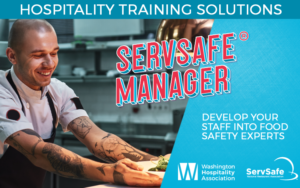








![[Class, May 20] ServSafe Manager, Kent](https://wahospitality.org/wp-content/uploads/2018/07/CALEND1-150x150.png)

